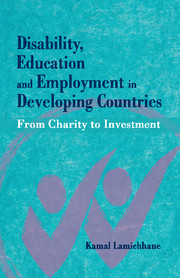Book contents
- Frontmatter
- Contents
- List of Tables and Figures
- Preface
- Acknowledgements
- 1 Fundamentals of Disability Studies
- 2 Disability and the Global Employment Situation
- 3 Disability and the Role of Education in Jobs: Case Studies from Nepal and the Philippines
- 4 Disability and Jobs in a Post-Conflict Country: Cambodia
- 5 Gender and Jobs: A Comparison between People with and without Disabilities in Bangladesh
- 6 Disability and Human Capital Investment
- 7 Disability, Poverty and Inequality: A Case Study in Nepal
- 8 Disability and Job Satisfaction Differentials
- 9 Disability and Determinants of Education: A Case from India
- 10 Disability and Barriers to Education
- 11 The Way Forward: Investment in Disability
- Index
- About the Author
4 - Disability and Jobs in a Post-Conflict Country: Cambodia
Published online by Cambridge University Press: 05 February 2015
- Frontmatter
- Contents
- List of Tables and Figures
- Preface
- Acknowledgements
- 1 Fundamentals of Disability Studies
- 2 Disability and the Global Employment Situation
- 3 Disability and the Role of Education in Jobs: Case Studies from Nepal and the Philippines
- 4 Disability and Jobs in a Post-Conflict Country: Cambodia
- 5 Gender and Jobs: A Comparison between People with and without Disabilities in Bangladesh
- 6 Disability and Human Capital Investment
- 7 Disability, Poverty and Inequality: A Case Study in Nepal
- 8 Disability and Job Satisfaction Differentials
- 9 Disability and Determinants of Education: A Case from India
- 10 Disability and Barriers to Education
- 11 The Way Forward: Investment in Disability
- Index
- About the Author
Summary
Introduction
Numerous studies have been conducted on labour market participation in Cambodia. However, to the best of my knowledge, there have been few studies on issues related to the employment of disabled people in this country. Although there is as yet no quantitative study available on the labour market participation of people with disabilities, Gartrell (2010) employed an ethnographical approach to explore the employment situation of people with disabilities in Cambodia, and discusses how they experience systematic marginalization in the labour market through societal misconceptions that associate their disability with an inability to gain a high enough level of education to be employable in adulthood. However, the major limitation of his study is that as it covers one particular geographic area and captures only individual cases, the conclusion drawn from the qualitative findings cannot be generalized.
Low school completion rates contribute to low literacy rates among people with disabilities, and these, in combination with discrimination in the labour market, conspire to weaken their opportunities in employment. Therefore, other studies have looked at Cambodia's educational situation with a particular focus on examining the various challenges and barriers to education for children with disabilities. In questioning what is reasonable accommodation to ensure that children with disabilities can access schooling, Mak and Nordtveit (2011) studied children with hearing impairments and visual impairments in Cambodia and found that poverty and the economic instability of families were key hindrances to educational opportunities.
However, as stated earlier, there is little available data on the treatment of people with disabilities in employment in Cambodia, and hence little basis on which to make a comprehensive assessment of progress in this area. In this chapter, therefore, I attempt to fill this knowledge gap in the labour market participation of people with disabilities in Cambodia and provide a comparative prospective on the developing countries of South Asia and South East Asia. In addition, I consider the Cambodian genocide between 1975 and 1979 under the Khmer Rouge regime, in the course of which hundreds of thousands were killed while many others became disabled.
- Type
- Chapter
- Information
- Disability, Education and Employment in Developing CountriesFrom Charity to Investment, pp. 66 - 84Publisher: Cambridge University PressPrint publication year: 2015



